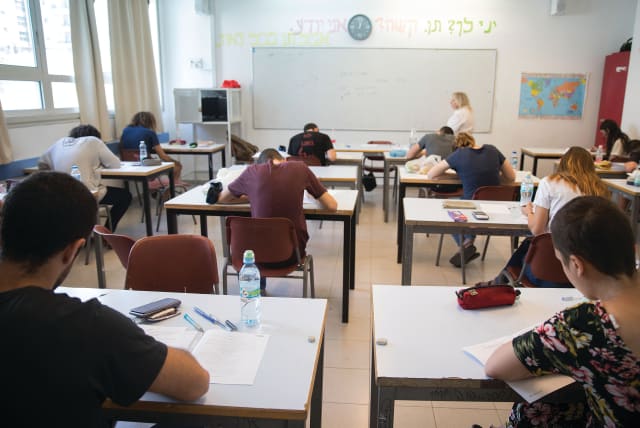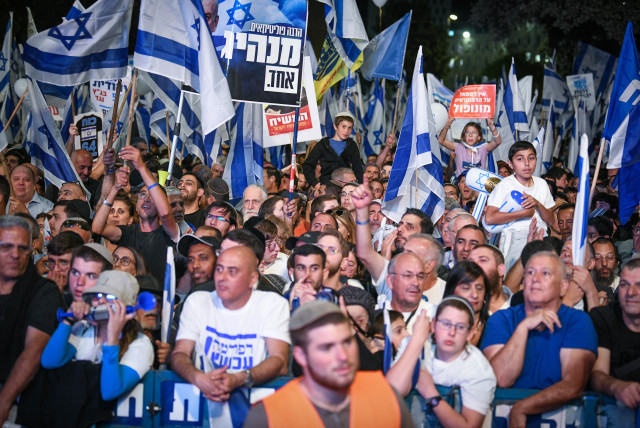Editor's Notes: The kids are not alright

Israeli teens lead the world in volunteerism and acts of selfless kindness, but there's a strain of extremism snaking its way through Israel’s youth that may change the face of the country.
Last Thursday, I found myself returning from an event in Tel Aviv shortly after the massive pro-government rally outside the Supreme Court dispersed. Emerging from the Jerusalem train station, I encountered swarms of animated teenagers milling around, carrying signs and wrapped in Israeli flags. Across the light tracks was something of a mosh pit, with dozens of teenage boys jumping up and down, pumping their fists in the air and shouting along to a rhythmic song blasting from a sound system, all while waving a yellow flag. The song was “Zochreni Na” and the flag bore the clenched fist and black Star of David of Kach.
Based on a verse from the book of Judges, “Zochreni Na” ("Remember Me, Please") was composed by singer-songwriter Dov Shurin following the murder of Yaron and Efrat Ungar in a shooting attack, in 1996. It conveys Samson’s prayer for God to give him the strength to exact revenge on the Philistines after they gouged out his eyes; in the biblical story, God grants him a final surge of strength, which enables him to pull down the pillars of the Philistine temple, killing the people inside as well as himself.
In some of his performances of the song, Shurin has replaced the word “Philistines” with “Palestine,” and it has become one of the “revenge songs” sung in the aftermath of terror attacks and denounced by prominent rabbis. The song became infamous following the December 2015 “wedding of hate,” during which guests danced to it while waving rifles and knives in the air and stabbing an image of the Palestinian toddler Ali Dawabshe, who had been murdered along with his parents in the Duma arson attack several months earlier.
Kach, of course, is the terrorist group founded by Rabbi Meir Kahane and banned by Israel, the United States, Canada, and other countries due to its racism and support for violence against Arabs. Itamar Ben-Gvir, Israel’s current national security minister, is a former Kach activist who 13 years ago petitioned the High Court to allow far-right activists to march in Jerusalem waving the group’s flags (the court turned down the petition).
What most troubled me about the scene I witnessed was how utterly normative the teens appeared. With their modestly-sized knitted kippot and tzitzit dangling from their T-shirts and along the sides of their jeans, they looked pretty much exactly like my friends and I did at their age. Yet here they were, singing along to a call for revenge and waving a symbol of hate.
Extremism among Israel's youth, both Jews and Arabs
Extremism among Israeli young people – both Jewish and Arab – manifests in various ways, from voting patterns and expressions of intolerance to acts of deadly violence.
A startling number of recent attacks targeting both Jews and Arabs have been perpetrated by attackers under the age of 18: a January shooting that wounded a Jewish father and son in the Jerusalem neighborhood of Silwan was carried out by a 13-year-old Arab boy, and a 17-year-old Jewish teen has been held in administrative detention in connection with the deadly rampage through the Palestinian village of Huwara in late February.
During periods of heightened tension, social media platforms are awash with posts and videos glorifying and encouraging violence and offering instructions on how to murder Israeli Jews, and the streets of Jerusalem are stalked by roving gangs of Jewish and Arab teens seeking easy targets.
A 2020 survey by the Hebrew University’s aChord Center found high levels of intolerance among teenagers across Israeli society. 58.5% of haredi Israelis between the ages of 16 and 18 harbor negative stereotypes toward Arabs. 50.5% of Arab Israelis of the same age cohort harbor negative stereotypes toward haredim and 27.6% toward religious Jews. 41.3% of religious Jewish teens harbor negative stereotypes toward Arabs and among secular Israeli teens, 36.9% hold negative stereotypes toward haredi Jews and 19.4% toward Arabs. Based on that data, it is perhaps unsurprising that haredi, religious and secular Jewish teens all expressed high levels of fear and hatred toward Arabs, and Arab teens expressed the same, primarily toward haredi and religious Jews.
Surveys conducted ahead of the most recent election found that the Religious Zionism Party – which includes such individuals as Ben-Gvir, Finance Minister Bezalel Smotrich and former deputy minister Avi Maoz, all of whom have expressed deeply racist views – would garner the second most votes among voters between the ages of 18 and 25.
Pollster Dr. Menachem Lazar ascribes the increase in extremism to the sense of insecurity fostered by the violent riots that took place in various cities across Israel during the escalation between Israel and Hamas in 2021. “Some of us underestimate the trauma they produced,” he told Maariv in September. “They caused a major crisis.”
Dr. Liran Harsgor of the University of Haifa connects the trends to the absence of a peace process with the Palestinians. “Young people come of age politically at a time when there is no Palestinian partner from the Israelis’ perspective,” she says. “That’s public opinion: they don’t believe there’s even the possibility of ending the conflict.”
Regardless of the cause, though, this is a trend that we cannot ignore.
Israeli teens lead the world in volunteerism and acts of selfless kindness and many young people choose to serve their country and society in meaningful ways. The sight of young men and women in kippot and hijabs serving side-by-side as volunteer medics in Magen David Adom warms our hearts, and coexistence programs for Jewish and Arab teens, like the Hand in Hand schools and the educational institute at Givat Haviva, fill us with hope. There is a great deal of good that ought to be recognized and celebrated.
But there is also a strain of extremism snaking its way through Israel’s youth that, if left unchecked, may change the face of the country for years to come.
We all have a role to play in stemming the tide. Parents and educators should keep their ears peeled for expressions of hate and intolerance, even if made in jest or out of ignorance. Values of acceptance and the negation of harmful stereotypes should not only be reflected in school curricula but also in conversations at home. Rabbis and other communal figures should speak up – as many have – when radical figures exploit religious texts to justify their extremism.
Perhaps most of all, we should demand that our leaders serve as positive role models for our youth. A senior government minister who says that the Israel Defense Forces ought to “wipe out” a Palestinian village and has supported segregation between Jewish and Arab women in maternity wards should be made to understand that his extremism has no place in Israeli society. And his colleagues should say so.
There are few things more critical to the future of the Jewish state than ensuring that our children are committed to building a shared society in which people of all faiths, ethnicities, beliefs and backgrounds feel at home. That is our charge. We cannot afford to let them and the country down.
Jerusalem Post Store
`; document.getElementById("linkPremium").innerHTML = cont; var divWithLink = document.getElementById("premium-link"); if (divWithLink !== null && divWithLink !== 'undefined') { divWithLink.style.border = "solid 1px #cb0f3e"; divWithLink.style.textAlign = "center"; divWithLink.style.marginBottom = "15px"; divWithLink.style.marginTop = "15px"; divWithLink.style.width = "100%"; divWithLink.style.backgroundColor = "#122952"; divWithLink.style.color = "#ffffff"; divWithLink.style.lineHeight = "1.5"; } } (function (v, i) { });

